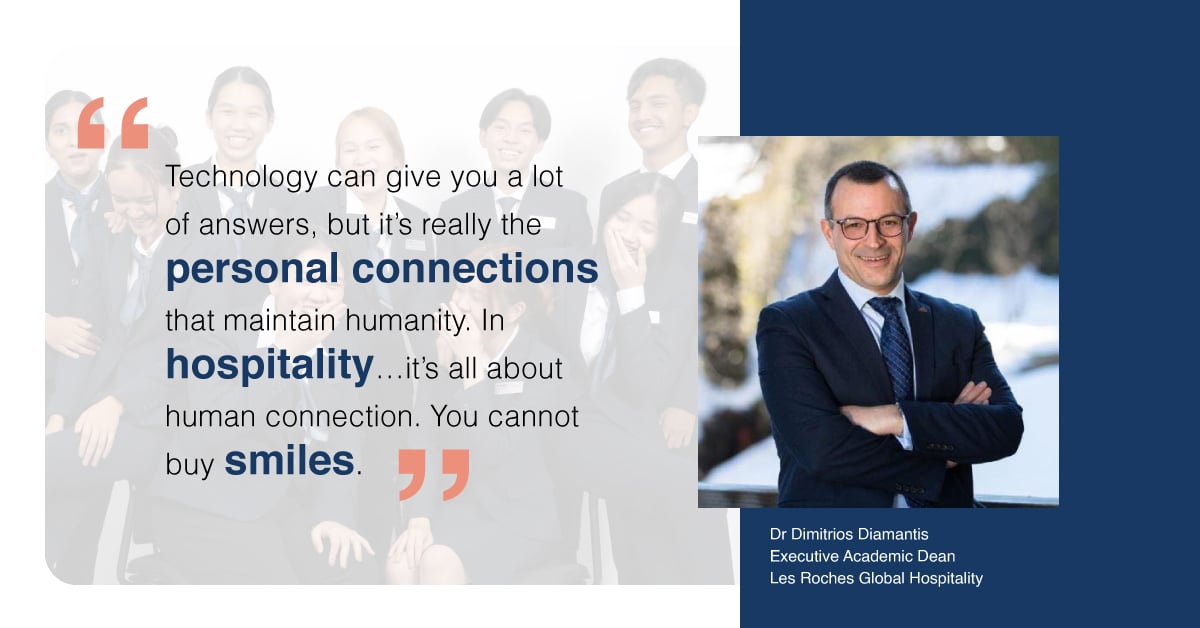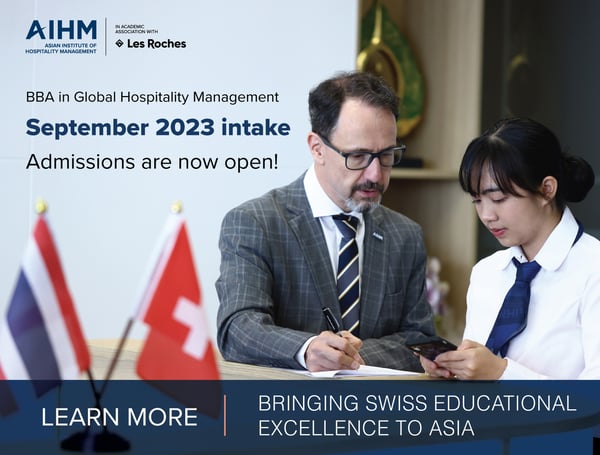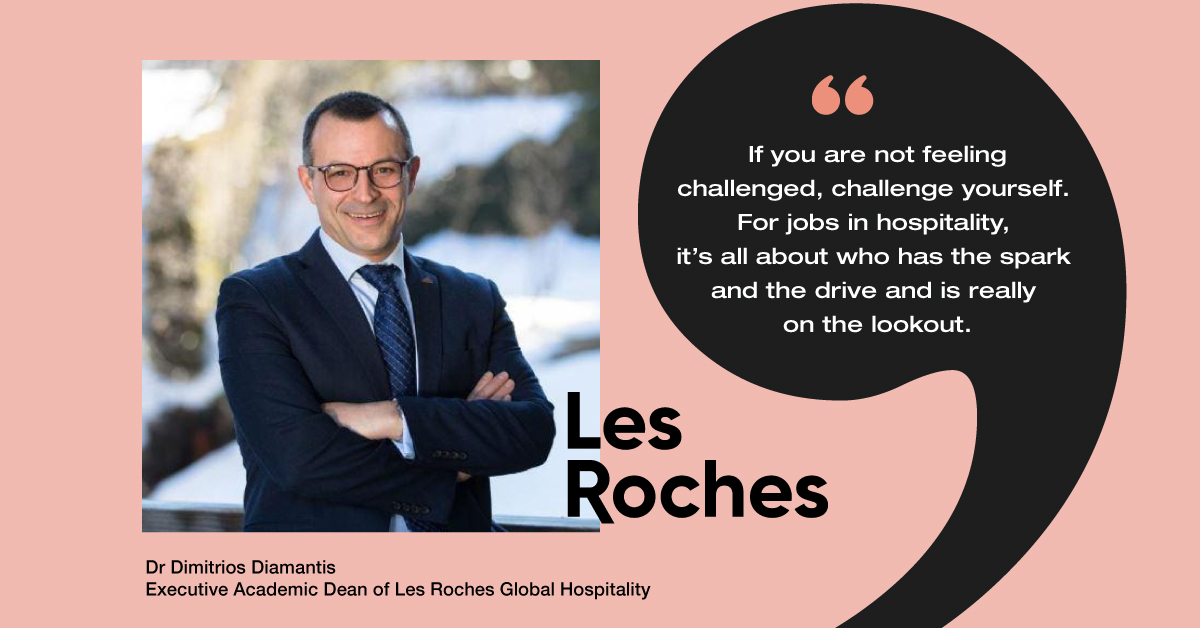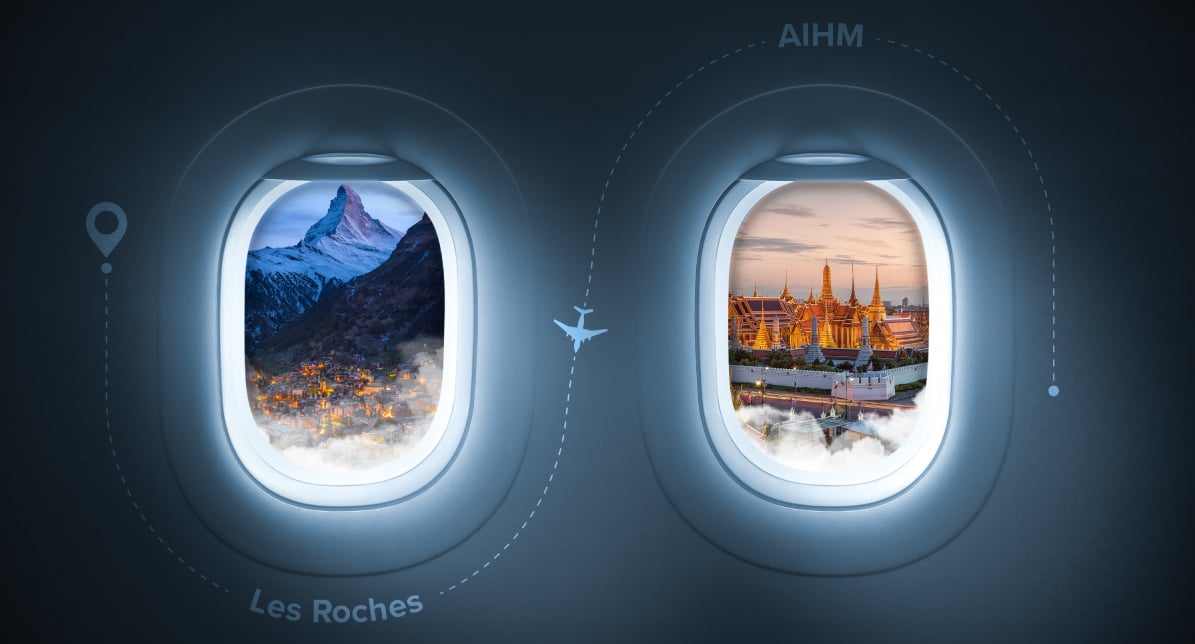AIHM Exclusive: An Interview with Dr Dimitrios Diamantis – Part 1

Student life at the Asian Institute of Hospitality Management in academic association with Les Roches is filled with opportunities and excitement. As part of the enrichment offering at AIHM, our students, faculty and team members had the incredible opportunity to attend a masterclass on Tuesday the 25th of April 2023.
The talk, “The Future of Hotels, Restaurants and Travel”, was delivered by Dr Dimitrios Diamantis, the Executive Academic Dean at Les Roches Global Hospitality.

Afterwards we sat down for an exclusive interview to dive deeper into the unique relationship between the pioneering Swiss hospitality school and our new higher-education institute based right in the heart of Southeast Asia.
I invite you to read our conversation below to discover Dr Diamantis’ insights, his impressions of AIHM and his advice for aspiring hospitality executives.

A Life at Sea and Exploring the Globe
SLM: Thank you again for joining me today and for this interview. It’s so wonderful to have you here with us at AIHM. For those who were not able to join your Master Class yesterday, could you tell us a little bit about yourself? You have a wonderful personal and professional story that I think would be very inspiring for our community to hear about your journey as well.
DD: Thank you so very much, Samantha. It’s always a great pleasure to sit down and talk to you. Yes, I started my hospitality education in 1989. I left my place of birth, Greece, in 1989 and went to study hospitality at South Bank University in the London area. Subsequently, I went to the University of Surrey, where I did my Master’s. I started my PhD there, and then I completed it at Bournemouth University because my renowned supervisor and professor Chris Cooper took up a new position at Bournemouth University. In Bournemouth I went on to complete my doctorate and began applying for different jobs.
Back during that earlier phase of my career, I knew I wanted to seek a position in Switzerland because it was so renowned amongst academics. I joined Les Roches in 1999, first as a lecturer in the final year in the Bachelor of Business Studies. At that time, I introduced various new components to the school and the curriculum. Then I made the recommendation for graduate programs—that is, the PDD (Post-Degree Diploma) and ultimately the MBA. I was given the responsibility to establish the MBA programme at Les Roches early in the year 2002.
Then, I was part of the early teams of people that helped launch our campus in Spain – Les Roches Marbella. Together with the team from Les Roches in Switzerland, we conducted the early trainings for the Marbella faculty and staff, the faculty development training in 2002.

I’ve been a part of the Les Roches story since 1999. After my first several years there, I moved on from Switzerland. I wanted to advance further, to branch out and reflect a little bit about my teaching and professional practices. I went back to United Kingdom where I was appointed as a Senior Lecturer at Sheffield Hallam University, which is a big university. I stayed there for three years, and while I was there, I also maintained my connection with Swiss hotel schools. I returned to Switzerland in 2010, was appointed as Programme Manager of the MBA at Les Roches in 2012, then Dean of Graduate Studies in 2016, and then in 2021 the governing board appointed me as the Executive Academic Dean. This is an amazing role and at the same time quite challenging. This position gives you a platform to reflect, to grow the school, to heighten its quality, to advance its programmes, to enhance the internationalisation.
Having been an early part of the school, I was fortunate enough to meet two of the four brothers who developed Les Roches. I was appointed by two of them in the early days of the school’s current iteration, in 1999. They used to have a very personal hand in who was coming to work at the school. The school at the beginning was, and still is, a very family-oriented environment. This is reflective of the spirit of Switzerland, especially the region that we are in. They devoted their personal attention to everything. Their principles still flow through the veins of our school.

So that’s all in all my professional background. As an academic, I specialise in sustainability and tourism destination planning. I have a very active interest in research in these areas, and I published a lot in my early days when I had a different professional capacity and role. I produced what were for me some very fascinating publications on ecotourism and the globalisation of tourism and hospitality, on a yearly basis. Right now, I’m only maintaining a small research footprint. If times allows, in a few years I’ll definitely dedicate more time to writing and researching. That’s one of my passions and something which I love to do.
SLM: Thank you so much for sharing your career story with us. I think it’s really important for our students to hear about your journey because it’s not a straight because in progressing on your path, you took the time to reflect. It’s so important as a professional to make sure that we’re going in the direction that we want to be going.
DD: Yes, it’s not a straight line. You know, I born on an island in Greece. My father was in the maritime business. The place I’m from in Greece is very renowned in the maritime sector and as a result of that a lot of people get involved in shipping activities. I first left my home in Greece at the age of two. I grew up in Japan as well as travelling with my father. Every summer from age 6 until 18, I travelled on the cargo ship or oil tanker or the cruise ship that he was a captain for. When it was the time to leave home and make my own way, I felt I knew the world but not so much my place of birth. This outlook and connection to the interconnectivity that exists between places allowed me to choose hospitality… It taps into a global perspective and the ability to practice your craft in different parts of the globe. That was something that really attracted me from a very young age.

The Swiss Model of Hospitality Education
SLM: To be a global citizen in the way that you’ve described is so important. I think that’s one of the common threads we see with all of our students. If they haven’t had the opportunity to branch out and become a global citizen yet, they have a desire to be one.
DD: Definitely, I think that’s very true for hospitality, especially from our perspective, from the vantage point of Swiss hospitality schools. Although they are in Switzerland, the Swiss model highlights a global outlook, innovation, punctuality, attention to detail. Those things can be transported and can be taught in different kinds of global scenarios. And in our classes, it’s all about a global outlook. So yes, you do cover the theory. But you also give global examples that people can relate to. In the traditional kinds of marketing product lifecycle graphs, you will find that a lot of different kinds of companies may be at one stage in one part of the world and at different stages other parts of the world. So, by teaching with a global outlook, it allows you to really address the range of growth areas in different places around the globe. That helps students to cultivate the different kinds of globally relevant attributes they are trying to develop.
SLM: Yes, having this mindset is an important trait to have to succeed in this industry. This allows you to be open to change and to understand all cultures are different so that you can appreciate and celebrate that.
DD: Exactly. You have to be open to change and respect the fact that change is inevitable. Of course, sometimes there’s a lot of resistance to change. At the same time, it’s important that reflection is happening. That way, the change can be long lasting. That’s extremely important.
SLM: Could you tell our readers who are seeing this interview online what the partnership with AIHM means for Les Roches from your perspective as the Executive Academic Dean at Les Roches Crans-Montana?

DD: This partnership really points to our global outlook. As a school, we started our journey in 1954. From the early founders of our school—the Clivaz family—to our current leadership, a global outlook has been one of the most important things the school seeks to celebrate and highlight. The association Les Roches has with AIHM really strengthens the Les Roches brand: ‘Global Hospitality Education’. It gives us global perspective. It gives us this kind of exchange that can happen in Southeast Asia. Being in an international city like Bangkok with a lot of hotel properties, with a wealth of hospitality brands, with a lot of other diverse companies, it gives you this kind of global accessibility and global footprint. At the same time, our relationship allows us to have interesting exchanges. It gives us a lot of opportunities—for future growth, for research practices, for academic collaborations, for enhancement of industry practices in the local area. Having a local partner allows us to enhance the relationships we have.
We have a huge community of Les Roches alumni over here in Bangkok, in Thailand and across the region. In the last kind of couple of days that I’ve been over here, I’ve been receiving quite a lot of messages daily, messages from my former students going back 20 years. It’s wonderful to know that they still have a sense of community with our school. They have a community they can engage with and grow at the same time. By and large, the majority do continue to engage with us. It’s important for them to know that their school is still next to them. As they grow older, they appreciate even more this connectivity and these relationships, and the value that exists in these relationships.

Les Roches Stories and the Power of Community
SLM: You had mentioned that collaboration is very important, and you illustrated that in the way you just spoke about this interconnectedness. Collaboration exists not just in the years that students are on campus, but it continues and reverberates exponentially. We never know how the kindness that is shown to students as they enter Les Roches or AIHM will continue to affect the world in an amazing way.
DD: I’ll give you an example. Last year we had an alumni reunion at Les Roches Crans-Montana. This year at the beginning of May we have a global alumni reunion at the campus of Les Roches Marbella. This is a big event for our alumni. The event includes a lot of time for reconnecting and for social interaction as you would expect. But also, there’s space for thinking, for thought-provoking seminars, for meetings and activities of our alumni as working professionals in the industry who can contribute value to our shared community. A lot of alumni are part of not just the hospitality industry but the broader experience economy. There’s a lot of opportunity for collaboration, forging connections, and great examples of entrepreneurship across the board.
Across economic sectors, discussions can occur, and that’s actually an important role of the school. As a school, we’re in touch with different individuals throughout the year. They might or they might not know each other. So having a school as the centre-point, it allows this kind of community to be maintained. Our community of alumni is an important asset, and that’s really something that we’re spending a lot of attention on fostering. I’m a collector of the old Les Roches newsletters from the 1990s, and they include alumni stories from every part of the world. It’s really wonderful to see these stories, and this sharing is something we continue these days.
SLM: I love to hear what people are passionate about and what sticks after so long. To hear that you’re collecting these and about your passion for the students’ stories, that stands out for me. It’s so incredible to hear that. We’re really happy to be a part of this community and to be extending the Les Roches model of Swiss hospitality education to Asia. Could you tell us what makes Swiss hospitality education different?

DD: Switzerland, in general, possesses certain fundamental values. First of all, there’s a respect for autonomy. Secondly, there’s a quality of precision, of efficiency, of a system that works, and that’s something that is transported via Swiss hospitality education. Switzerland is a very hard-working country. It cherishes the principle that hard work pays off. That’s one of the fundamentals in Switzerland. Also, it prioritises punctuality. Those are the ethics communicated through our classes and through our activities.
Switzerland also respects tradition. The balance between tradition and modernity are quite well maintained. At the same time, it’s an extremely innovative country. These values are carried through our educational frameworks of what we expect our students to do—in their own day-to-day activities and what they instil in their teams and the people they manage.
Swiss hospitality education is renowned because it’s built around these particular kinds of principles. There’s a lot of attention to detail and also a lot of space for creativity and flexibility to create and move forward. That’s a really good balance. Of course, it takes some time to strike this balance correctly, to balance an obsession with punctuality with room for creativity, for example. Striking this balance is something that’s done quite well in this part of the world.
For us as Les Roches, not only are we showcasing flexibility; we’re educating students in tradition and adaptability. Those are the principles of the country that go through our curriculum, our approaches, our thinking.
On the other hand, Switzerland has an expectation to remain at the top of hospitality education. That’s why when you look at school rankings, Swiss hospitality schools are well represented in the top 10. That comes from a lot of hard work and pride in showcasing something, of showcasing a history, of continuing something that’s been done here for many years. You can see it for example with our sister school Glion, who have been doing it since the 1960s, and ourselves, Les Roches, who have been doing it since 1954.
In the modern world that we’re living in, it’s important not to lose sight of the roots of a place, because that’s actually what makes us who we are. Every company in Switzerland has this kind of attention to detail, but at the same time a balance with modernity, innovation and entrepreneurship. There’s a balance between these things and tradition.

Hospitality and Human Connection
SLM: One of the things I took away from your Master Class yesterday is that importance of balancing technology and tradition. You mentioned that as we advance in technology, the desire to have more of a personal touch or something that’s unique and more human centered is necessary.
DD: Completely necessary. Technology can give you a lot of answers, but it’s really the personal connections that maintain humanity. In hospitality…it’s all about human connection. You cannot buy smiles. If you look at hotel brands, from Four Seasons to Peninsula, Mandarin Oriental, Marriott, any top brand we see in our industry plus small - and medium-sized enterprises, it’s all about personalisation. It’s all about touch, the touchpoints you’re going to provide to guests. Technology can advance a lot of your business efficiencies, but at the same time it’s humans driving the technology. Technology cannot create itself. A balance has to be struck, particularly for the hospitality sector.
SLM: For students reading this interview, if you’re working on developing your own personal aspect of balance in your life, that’s something you’ll have to continue to work on. As illustrated, that’s something that’s ever-evolving. The world changes, and you have to change with it.
DD: If you look at our young students, students today have grown up with technology. Dominant technologies like the internet have been with them their entire lives.
I remember the history of my assignments in school. At first, we did handwritten assignments. Then we had assignments we’d produce on a typewriter. Then my first assignment on a computer was at university in 1990. They had a computer lab you could use. It didn’t really change anything in the substance of the communication. You pick and choose what’s relevant in a certain context.
SLM: What I always say to our students is: ‘I will give you many tools. You have to test and see what works for you to make sure that your approach and life works for you, and it’s going to be different from someone else’s approach. We will give you the tools. You have to see what matches your situations.’
DD: Exactly right. That’s the right approach.

SLM: Could you tell me a little bit more about what the value and benefit of this partnership is for Les Roches as an institution and for your students in Switzerland?
DD: The value first of all is to enhance our connectivity, our global output and our global outreach as a hospitality education brand and provider. We have a responsibility to pass our knowledge and experience on in different parts of the globe. That makes us more sustainable and at the same time enhances our day-to-day working environment back home.
The benefits depend on the stakeholders we’re talking about. The benefit for the students is that this partnership enhances their scope of possibilities for global exchange and can give them opportunities for global growth. Students from Switzerland, for instance, will be having an exchange at some point in time with the students over here. Students from AIHM have the opportunity now to come to Switzerland to continue their studies. For faculty, that benefit of exchange also holds true. Faculty can enhance their globality, their research partnerships, their collaboration.
For owners, the partnership expands and strengthens the organisation’s global footprint. They can be able to showcase their organisation as a top provider of hospitality education in a global setting. It’s important for us to advance our Swiss ethos, but also in a global sense.
SLM: We feel that the space for collaboration and community that has been built between us and Les Roches has been so supportive. We felt it here as individuals, our students feel it, and our faculty feel it.
DD: Thank you for that. It’s very important to me as well. This is important to me personally. I really value the global experience and fostering strong collaborations. One of the of the fundamental components of my job is to make sure that we all feel supported, that you feel totally supported. I also have to say you’re in a wonderful location. Your campus is so inspiring. The views over Bangkok and the riverside setting are magnificent. As a Greek person, being by the water makes me feel at home. I love it here.

SLM: The views here and in Switzerland are stunning and extensive, and that allows us to really think big. We can already see so much of the world from our windows.
Speaking of what is shared between our schools, could you talk more about the benefits of studying at AIHM and Les Roches? There are so many things that you’ve touched on already, but could you speak to what students are really able to garner from choosing us for their further education?
DD: We try to bring Swissness into your school. By Swissness, I mean the items we talked about a little earlier. If you’re looking around your campus, you can look around and see and feel that you’re also showcasing Switzerland. I can see the national outlook, dynamic learning, all those attributes that are so important. Similar stories are happening at our school as well, exactly the same kinds of the messages. The learning environment feels extremely similar to what we have in Switzerland.

You also have an international faculty that allows students to reflect international standards of practices. At the same time, you have freedom to make choices in terms of focus, to create opportunities for students based on your own context and educational assets.
Your location is really exceptional. You’re situated in a magnificent hotel property, Avani+. At the same time, you are embraced by a shopping mall. Also right here, you have another fine property, the Anantara. The environment students are immersed within is showcasing hospitality daily. You’re a part of a live operation, and this live operation allows students to experience the application of their lessons quite easily. That helps tremendously. You have a fantastic location in a dynamic city.
Part 2 of AIHM’s interview with Dr Dimitrios Diamantis is coming soon. Follow the Asian Institute of Hospitality Management on Facebook for the next update.…
Dreaming of a Career as a Hospitality Leader?
Obtain a Swiss hotel school education in the heart of Southeast Asia. Explore AIHM’s BBA Degree in Global Hospitality Management.



